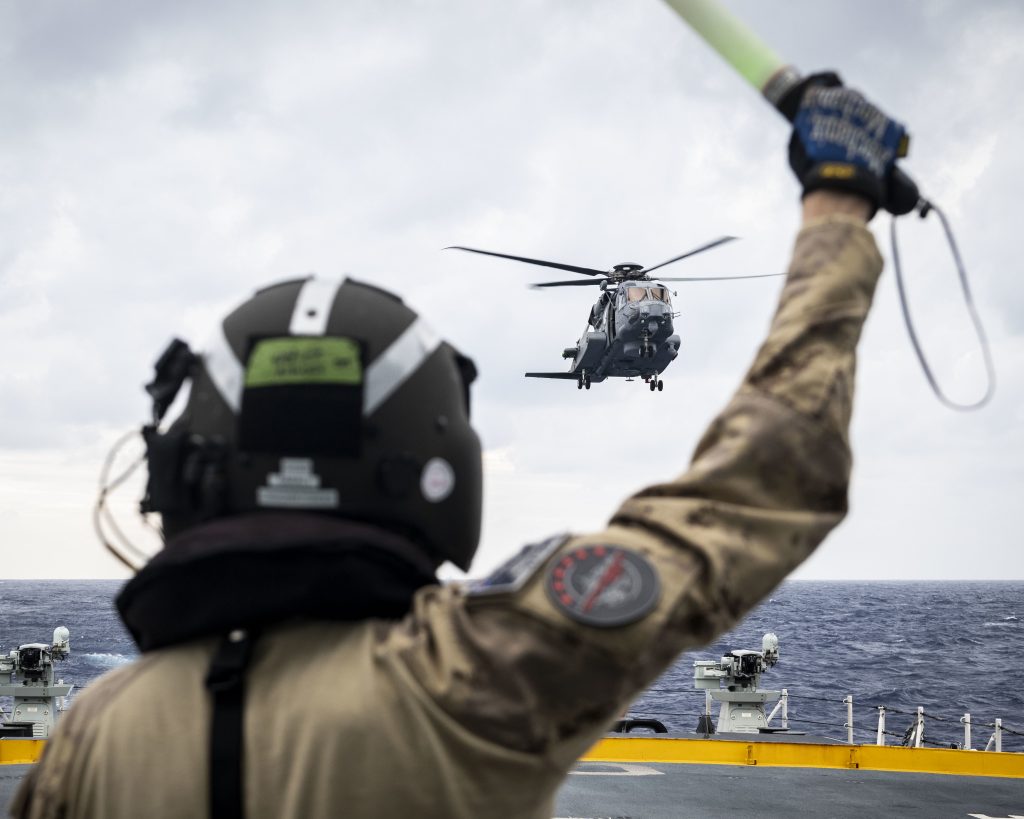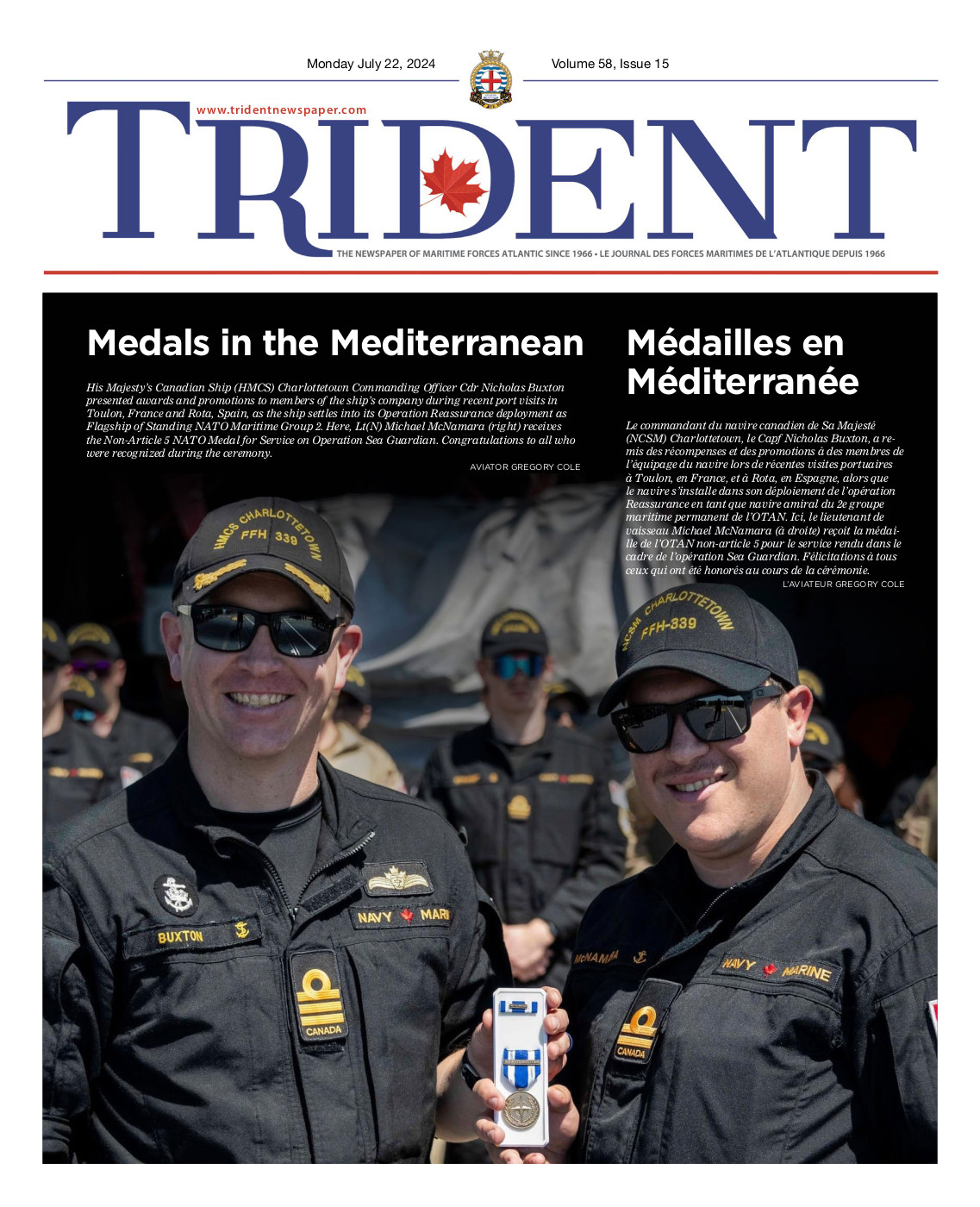
A time to reflect: Cpl Eric Kappler
By Kateryna Bandura,
The Lookout
Corporal (Cpl) Eric Kappler sees Remembrance Day as a time to reflect on what his family has given in service.
Remembrance Day holds special meaning for the Avionics Technician (AVS) aboard HMCS Ottawa – his grandfather was a Carpenter’s First Mate aboard USS Medusa, a repair ship during the attack in Pearl Harbour. It’s hard not to think about the visceral combat experiences his grandfather faced as they change a person forever, Cpl Kappler says.
Cpl Kappler has also received recognition throughout his 16 years in the military. Along with a Canadian Forces’ Decoration, he has been awarded a Special Service Medal for Operation (Op) Reassurance and a Unit recognition for Tech of the Quarter.
The amazing and challenging life of an AVS would not have opened for Cpl Kappler if not for his father, Staff Sergeant Steven Kappler, a former U.S. Air Force Staff Sergeant with operational tours in Holland, Turkey, and Lackland Air Force Base in Colorado with the Emergency Response Team and Nuclear Weapons Unit.
Before joining the military in 2007, Cpl Kappler worked in the vehicle electronics industry, where the work was drying up. Rather than move cities to start at the bottom again, his father suggested enrolling would provide him with necessary skills and tempering.
“I didn’t give it much more thought until I started exploring what was involved in my trade a few months later, and decided to call a recruiter,” Cpl Kappler says. The recruiter asked if Cpl Kappler liked camping, and offered a land trade, but Cpl Kappler decided to wait for AVS.
“A couple of weeks later it happened, and I have never given another trade a second thought,” he says.
During his exit interview at Saint Jean sur Richelieu, the course director said his career would resemble working in an office, and suggested to expect a lot of detail-oriented paperwork. From there, his words echoed as Cpl Kappler progressed through Trades training. But, he says, being an AVS is more than just working in an office.
His first posting was to 443 Maritime Helicopter Squadron in Patricia Bay, B.C., as an apprentice Avionics Technician on the CH-124 Sea King. He says a few people joked he was now in the Navy instead of the Air Force, but Cpl Kappler kept an open mind and waited to see how things would shape up after becoming a Journeyman Technician.
“Integrating with the folks in the Naval environment at sea and at home has become easier with my experience as we continue to develop new ways of doing business together,” he says. For example, the Shipboard and Land-Based Helicopter operations are evolving to incorporate wireless headsets. Cpl Kappler says it’s a long overdue capability that other nations have already included.
“It’s an approach that employs modern communication platforms and just makes good sense,” he says.
Over the years, Cpl Kappler says he’s had several opportunities to employ core skill sets, specialty skills and professional development courses that have all served him well. He was deployed during RIMPAC 2012 with HMCS Algonquin, then HMCS Protecteur during its final Exercise Midpac Oiler, and HMCS Winnipeg, Calgary, Vancouver, and Regina for various SWOADs (Ship Without Air Detachment for recovering a helicopter when Air Detachment is not embarked) and other fleet training support exercises. He also deployed with HMCS Charlottetown during Op Reassurance from the East Coast in 2016. Op Reassurance also presented a unique opportunity for him to visit a relative in Europe instead of flying directly home from France. He took full advantage of the opportunity to drive through the Alps from France and ended up in Belgium – a feeling Cpl Kappler said he will never forget.
Exercise Midpac Oiler was the most memorable time of his career and one of the most intense situations Cpl Kappler has experienced. HMCS Protecteur was 300 miles from the coast of Oahu, heading home when the engine room suffered a catastrophic fire due to an oil line on the main engine rupturing, sending atomized oil into the space, which then ignited, producing a fire hot enough to warp walkways and melt glass on gauges. During that time, Cpl Kappler was deployed as a Flight Deck Handler.
“There were some definite ‘lessons learned’ moments in the way the DC response was managed that have since been put into the current training doctrines,” Cpl Kappler says.
Life lessons that Cpl Kappler took on his personal growth journey involve learning more about Post-Traumatic Stress Disorder (PTSD) and finding resources for Canadian Armed Forces (CAF) members. He found an echo of this pursuit in the book A Soldier First by General (ret’d) Rick Hillier.
“His book shed some very important light on mental health resource deficiencies in the CAF at the time. To say it struck a chord with me would be putting it lightly,” Cpl Kappler says. “We’re socially conditioned to expect people in the military to be bulletproof. Nothing lands further from the truth… I believe we can do far more for those who are living with mental health challenges and re-evaluate why members still fear reprisal for reporting things or leadership styles that are not working.”
Living through intense experiences encouraged Cpl Kappler to mentor and bestow his personal lessons learned upon others. During his current deployment aboard HMCS Ottawa, Cpl Kappler says he helped mentor a junior AVS Technician who grew both professionally and personally.
“I make sure those who have helped get me on track for success know it, and I try to model those qualities for people who can benefit from them,” Cpl Kappler says. “For me, the greatest impact has been sharing knowledge with junior members and watching them develop, use new skills, and develop professionally. It’s a satisfaction all on its own.”
A piece of advice Cpl Kappler would offer to those starting their military journey is to seek out education opportunities.
“Build marketable skills that will serve you well long after you’ve finished serving,” he says.





